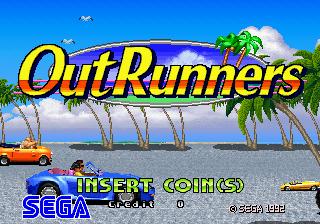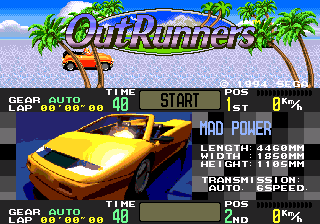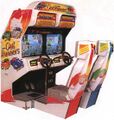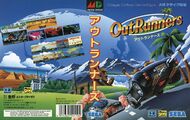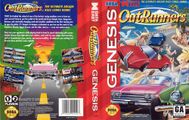OutRunners
From Sega Retro
| |||||||||||||||||||||||||||||||||||||||||||||||||
| OutRunners | |||||||||||||||||||||||||||||||||||||||||||||||||
|---|---|---|---|---|---|---|---|---|---|---|---|---|---|---|---|---|---|---|---|---|---|---|---|---|---|---|---|---|---|---|---|---|---|---|---|---|---|---|---|---|---|---|---|---|---|---|---|---|---|
| System(s): Sega System Multi 32, Sega Mega Drive | |||||||||||||||||||||||||||||||||||||||||||||||||
| Publisher: Sega Enterprises, Ltd. Sega Enterprises, Ltd. (JP) Data East USA (US) | |||||||||||||||||||||||||||||||||||||||||||||||||
| Developer: Sega AM1[1][2] Sega AM4[1] (cabinet) Sega CS3 | |||||||||||||||||||||||||||||||||||||||||||||||||
| Distributor: Samsung (KR) | |||||||||||||||||||||||||||||||||||||||||||||||||
| Licensor: Sega Enterprises, Ltd. (US) | |||||||||||||||||||||||||||||||||||||||||||||||||
| Sound driver: SMPS Z80 (modified) (SMPS 68000 port) | |||||||||||||||||||||||||||||||||||||||||||||||||
| Genre: Racing[3][4] | |||||||||||||||||||||||||||||||||||||||||||||||||
| Number of players: 1-4 1-2 | |||||||||||||||||||||||||||||||||||||||||||||||||
|
This short article is in need of work. You can help Sega Retro by adding to it.
OutRunners (アウトランナーズ) is a System 32 driving game developed by Sega AM1[2] and manufactured by Sega Enterprises, Ltd. The sequel to the classic 1986 arcade game OutRun, it was first released to Japanese arcades in May 1993[2], and like its predecessor, features extensive sprite scaling to simulate three-dimension scenery.
The following year, OutRunners was ported to the Mega Drive courtesy of Sega CS3, and is most notable for its downgraded presentation and forced splitscreen.
Contents
Gameplay
OutRunners follows a similar format to OutRun, in which the player is tasked with driving across the world within a specified amount of time. There are, however, twice as many areas as OutRun in OutRunners, as the world is divided into east and west (selectable after the first stage). Whereas OutRun took place in Europe and Turbo OutRun North America, OutRunners spans the entire globe.
The superior System 32 hardware allow for vastly improved graphics, eight selectable cars (a scrapped plan for the original OutRun) and more music tracks (including those featured in the original OutRun game). It was always distributed as a two player deluxe cabinet (hence the "System Multi 32" name), and it is possible to link two cabinets together to create a four-player racing experience. It was the first OutRun game to allow more than one player to compete at once.
Cars
| Easy Handling | |
|---|---|
| Smooth Operator | |
| Bad Boy | |
| Road Monster | |
| Quick Reactor | |
| Wild Chaser | |
| Mad Power | |
| Speed Buster | |
| The Ferrari Testarossa from the original OutRun, albeit with any unlicensed Ferrari badges removed and some differences in bodywork. |
Track Layout
Like the original OutRun, the journey in OutRunners contains many forks in the road, leading to one of ten possible endings. Players all begin at the same location, but are given a choice whether they want to take the eastern or the western routes. Some areas are repeated for both sides, though it is impossible to visit the same location twice in one outing.
| Goal | Stage Number | Goal | ||||||||||
|---|---|---|---|---|---|---|---|---|---|---|---|---|
| 5 | 4 | 3 | 2 | 1 | 0 | 1 | 2 | 3 | 4 | 5 | ||
| A | Northern Europe | Russia | F | |||||||||
| Germany | Germany | |||||||||||
| B | Switzerland | China | Switzerland | China | G | |||||||
| France | Hawaii | Niagara Falls | France | |||||||||
| C | Atlantic Ocean Underwater Tunnel | Japan | San Francisco | Start | Grand Canyon | Atlantic Ocean Underwater Tunnel | Japan | H | ||||
| Mediterranean Sea | Pacific Ocean Crossway Bridge | South America | Mediterranean Sea | |||||||||
| D | Spain | Hong Kong | Spain | Hong Kong | I | |||||||
| Egypt | Egypt | |||||||||||
| E | Kenya | Australia | J | |||||||||
History
Development
System Multi 32 version
In the wake of Virtua Racing proving popular, Sega wanted to capitalize on this and double-down on the racing genre, instead of the space genre which was oversaturated at that point[8]. The idea came up to revive the OutRun franchise, but the series' previous developer Sega AM2 was not involved in this sequel, with development instead being handed over to Sega AM1, featuring developers responsible for previous System 32 games like Spider-Man: The Videogame, Stadium Cross and Golden Axe: The Revenge of Death Adder.
Game design was handled by Makoto Sugawara, who had not played OutRun before and was very critical of the game, leading to many gameplay changes to reflect more modern tastes in 1992[8]. It was decided early on to focus on making 8-person multiplayer a prominent feature[8], inspired by Namco's Final Lap 2 from 1990[9].
Masaki Kondoh, a veteran graphic designer who had worked on Fantasy Zone and Galaxy Force, created background art for the game. Because references were less readily available at the time than in years to come, Kondoh had to gather photos from other developers who had travelled internationally so that he could accurately represent the various countries which appear in the game[9].
The soundtrack was developed by 3 people from the AM Sound team. Initially it was assigned only to Takayuki Nakamura, who previously did Stadium Cross for AM1. OutRunners reuses the program Nakamura created for Stadium Cross, which used MIDI instead of the more conventional MML of the time[10]. Nakamura felt it would not be possible to complete the entire soundtrack on his own[10], so enlisted his close co-workers Hiroshi Kawaguchi (the composer of OutRun and another person involved with Stadium Cross) and Takenobu Mitsuyoshi (the composer of Virtua Racing who was concurrently working with AM1 on Puzzle & Action: Tant-R). Mitsuyoshi, who was also a member of Sega's live arrangement band the S.S.T.Band, created the new arrangements of the 3 songs that were options in the original OutRun: Magical Sound Shower, Passing Breeze and Splash Wave.
Legacy
OutRunners was first ported to the Sega Mega Drive by Sega CS3. The game was the third most highly-requested port for the Sega Saturn's Sega Ages line[11][12], but this never materialized. There would not be another OutRun game released until 2003, when OutRun 2 was brought to Sega Chihiro hardware.
OutRunners received a spiritual successor on the H1 Board, that being Cool Riders, which uses the same base gameplay and a mostly different visual style. It was created by some of the same developers like game designer Makoto Sugawara, programmers Kazunari Tsukamoto and Kazutomo Sanbongi, and artists Tetsu Nakajima and Keiichi Baba. Other members of the OutRunners development team transferred to the CS departments in 1993 to work on early Saturn games, those being Panzer Dragoon (by programmer Hidetoshi Takeshita) and Clockwork Knight (by artists Toshiyuki Mukaiyama and Katsuhisa Sato).
OutRunners is the first in a line of AM1 games to secretly include the song Jingle Bells, later appearing in Sega Ski Super-G and Harley-Davidson & L.A. Riders[13].
Sega Logistics Service announced it would end service on the arcade machines on March 31, 2017.[14][15]
Versions
Though it was the most popular game for Sega's Multi 32 hardware, unlike its predecessors OutRunners only received one home console port, to the Sega Mega Drive in 1994. In this port, the screen is split horizontally into two in an attempt to mimic the two screens of the System Multi 32 platform. This, along with the reduced graphics quality and scaled back special effects, meant this version of the game is often the subject to harsh criticism. For some reason, Data East published the game in the US; it was not released in Europe.
Comparisons
- Main article: OutRunners/Comparisons.
Production credits
- Main article: OutRunners/Production credits.
Digital manuals
Magazine articles
- Main article: OutRunners/Magazine articles.
Promotional material
- Main article: OutRunners/Promotional material.
Artwork
Photo gallery
Physical scans
System 32 version
| Arcade, JP | ||||
|---|---|---|---|---|
| Arcade, DE | ||||
|---|---|---|---|---|
Mega Drive version
| Sega Retro Average | |||||||||||||||||||||||||||||||||||||||||||||||||||||||||||||||||||||||||||||||||||||||||||||||||||||||||||||||||||||||
|---|---|---|---|---|---|---|---|---|---|---|---|---|---|---|---|---|---|---|---|---|---|---|---|---|---|---|---|---|---|---|---|---|---|---|---|---|---|---|---|---|---|---|---|---|---|---|---|---|---|---|---|---|---|---|---|---|---|---|---|---|---|---|---|---|---|---|---|---|---|---|---|---|---|---|---|---|---|---|---|---|---|---|---|---|---|---|---|---|---|---|---|---|---|---|---|---|---|---|---|---|---|---|---|---|---|---|---|---|---|---|---|---|---|---|---|---|---|---|---|
|
| 52 | |
|---|---|
| Based on 23 reviews | |
| Mega Drive, AS† (NTSC) |
|---|
|
Technical information
- Main article: OutRunners/Technical information.
References
- ↑ 1.0 1.1 File:VirtuaRacingandOutRunners CD JP Booklet.pdf, page 13
- ↑ 2.0 2.1 2.2 2.3 Sega Arcade History, Enterbrain, page 127
- ↑ File:Outrunners md jp cover.jpg
- ↑ 4.0 4.1 https://sega.jp/history/hard/megadrive/software.html (Wayback Machine: 2020-07-20 09:51)
- ↑ https://archive.org/details/gambler_magazine-1997-04/page/n39/mode/2up?view=theater
- ↑ Harmony, "1994 5-6" (JP; 1994-05-23), page 39
- ↑ 7.0 7.1 7.2 GamePro, "August 1994" (US; 1994-xx-xx), page 46
- ↑ 8.0 8.1 8.2 GamePro, "August 1994" (US; 1994-xx-xx), page 22
- ↑ 9.0 9.1 GamePro, "August 1994" (US; 1994-xx-xx), page 23
- ↑ 10.0 10.1 OutRun 20th Anniversary Box
- ↑ GamePro, "August 1994" (US; 1994-xx-xx), page 23
- ↑ https://ghostarchive.org/archive/giwvE
- ↑ @hyasuhi6 on Twitter (Wayback Machine: 2021-04-20 21:58)
- ↑ File:SegaProductsTerminationAnnouncement 2016-11 JP.pdf
- ↑ File:SegaProductsTerminationAnnouncement 2016-12.pdf
- ↑ Beep! MegaDrive, "June 1994" (JP; 1994-05-07), page 18
- ↑ Cool Gamer, "9" (RU; 2002-10-13), page 150
- ↑ Computer & Video Games, "August 1994" (UK; 1994-07-15), page 97
- ↑ Digitiser (UK) (1994-07-21)
- ↑ Electronic Games (1992-1995), "July 1994" (US; 1994-0x-xx), page 70
- ↑ Entsiklopediya luchshikh igr Sega. Vypusk 1, "" (RU; 1999-xx-xx), page 346
- ↑ Famitsu, "1994-05-20" (JP; 1994-05-06), page 38
- ↑ Game Players, "Vol. 7 No. 8 August 1994" (US; 1994-0x-xx), page 50
- ↑ Hippon Super, "June 1994" (JP; 1994-04-30), page 62
- ↑ Joypad, "Septembre 1994" (FR; 1994-0x-xx), page 38
- ↑ Mega, "July 1994" (UK; 1994-06-16), page 47
- ↑ Mega Fun, "08/94" (DE; 1994-07-20), page 62
- ↑ MegaTech, "July 1994" (UK; 1994-06-16), page 48
- ↑ Mean Machines Sega, "August 1994" (UK; 1994-06-30), page 64
- ↑ Power Unlimited, "Jaagang 3, Jul/Aug 1995" (NL; 1995-06-28), page 54
- ↑ Sega Pro, "July 1994" (UK; 1994-06-16), page 44
- ↑ Sega Zone, "July 1994" (UK; 1994-06-xx), page 38
- ↑ Sega Mega Drive Review, "1" (RU; 1995-04-03), page 109
- ↑ Sega Saturn Magazine, "September 1995" (JP; 1995-08-08), page 87
- ↑ Tricks 16 bit, "Tricks Sega Gold 800 igr" (RU; 1998-03-20), page 131
- ↑ Video Games, "11/94" (DE; 1994-10-26), page 116
- ↑ VideoGames, "October 1994" (US; 1994-xx-xx), page 74
| OutRunners | |
|---|---|
|
Main page | Comparisons | Credits | Hidden content | Magazine articles | Video coverage | Reception | Promotional material | Region coding | Technical information | Bootlegs
| |
- 1-4 player games
- 1-2 player games
- All arcade games
- System 32 games
- 1993 System 32 games
- All 1993 games
- JP Mega Drive games
- All JP games
- US Mega Drive games
- All US games
- US Sega Channel games
- KR Mega Drive games
- All KR games
- Mega Drive games
- 1994 Mega Drive games
- All 1994 games
- Mega Drive racing games
- All racing games
- All games
- Stubs
- Archived reference without original link
- OutRunners
- OutRun (franchise)
- System Multi 32 games
- Mega Drive Mini 2 games
